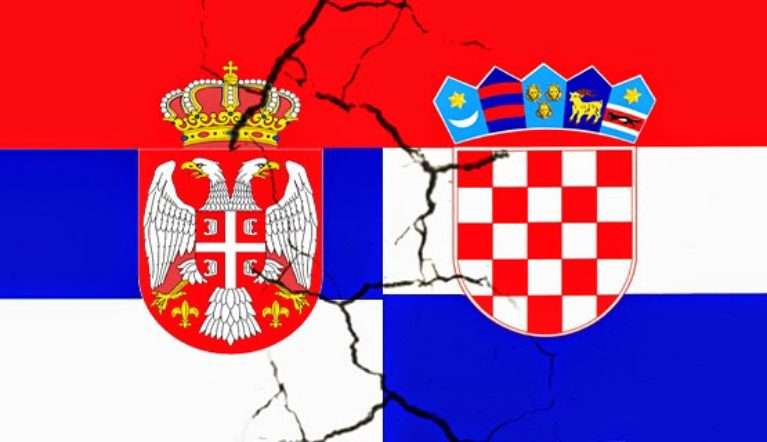Croatia-Serbia: A Summer of Discontent

Since the start of the summer Croatia and Serbia have entered into a diplomatic âwar of wordsâ, and tensions between the neighbouring countries have greatly escalated. This report seeks to explain the on-going crisis, highlight the implications for regional stability, and ask what/who is to blame?
Timeline of Events
7th April: Croatia blocks debate at the European Council on Serbiaâs opening of European accession chapters 23 & 24, citing concerns over war crimes prosecution and minority rights.18th July: Serbia opens Chapters 23 and 24 in its accession talks for EU membership.22nd July: Croatian Justice Minister confirms that Serbia has a list of 43 Croatian citizens that it is investigating for war crimes under its universal jurisdiction law.22nd July: A Croatian court annuls the conviction of Alojzije Stepinac, the former Cardinal of Zagreb during the Second World War who was convicted of collaboration with Nazi Germany, and forcing Orthodox Serbs to convert to Catholicism.24th July: Serbia accuses Croatia of historical revisionism and rehabilitation of fascism.1st August: Serbia officially protests the erection of a statue of a Croat nationalist convicted of assassinating the Yugoslavia ambassador to Sweden.2nd August: Serbian PM Aleksandar Vucic writes to the EU over âanti-Serbâ campaign by Croatia.2nd August: Croatia Culture Minister photographed holding a flag with controversial Ustasha (Croat fascist) insignia.5th August: Croatia publicly celebrates twentieth anniversary of Operation Storm, the military offensive that displaced over 200,000 mostly Serb citizens.14th August: Croatiaâs interior ministry announces that following an investigation over âfalse residenciesâ in the town of Vukovar, it will abolish the Serbian language and Cyrillic script as an official language of the town.17th August: Croatia threatens to adopt similar law to Serbia on universal jurisdiction that would enable them to prosecute Serb citizens for war crimes in Kosovo.
Synopsis
The foundation of the crisis concerns Serbiaâs progress towards EU membership, and Croatiaâs concerns regarding this. Croatia has attempted to block Serbiaâs EU accession due to Serbiaâs law on universal jurisdiction for the prosecution of war crimes committed on the whole territory of the former Yugoslavia. Croatia is concerned that Serbia is able to prosecute Croat citizens for war crimes, and set up its own âmini Hague Tribunalâ, rather than work on the EU principle of judicial cooperation.
Croatia was vociferous in its demands for Serbia to abolish its universal jurisdiction law, and Serbia too was publicly critical of Croatia. This is how the situation descended into a war of words and political finger pointing. Croatiaâs Foreign Minister Miro Kovac threatened severe measures if Serbia were to arrest a Croatian citizen for war crimes, after it was announced that Serbia had a list of 43 Croatian citizens it was investigating for war crimes. He stated âItâs time for Serbia to start thinking about there being commanders of Serb forces who were involved in the aggression against Croatia, so let them investigate those.â Serbiaâs Deputy Prime Minister Ivica Dacic called the conduct of the Croatian government as âbeyond all limits of normalityâ and described a âpathological preoccupation with Serbia and an anti-Serb hysteria in Croatia, led by the Croatian government.â
However, the situation further deteriorated as a series of sensitive incidents fuelled confrontation between the two countries. For example, a Croatian court repealed the conviction of the Nazi-collaborator wartime Cardinal Alojzije Stepinac, and a government minister was involved in a scandal where he was photographed holding a flag with Ustasha (Croatian Fascist) insignia. Such incidents led to Serbia accusing Croatia of historical revisionism and rehabilitating fascism. Serbiaâs fears have been further augmented by Croatiaâs very public celebration of the anniversary of Operation Storm, an offensive that created many civilian refugees who live in Serbia today. The crisis is ongoing, and tensions remain high between the two countries.
What is to blame?
Politics: Certainly internal political conditions have proved a huge factor in this escalating diplomatic war, as both Croatia and Serbia possess bordering on-nationalist governments unwilling to compromise with the other. In Croatia there has been a supposed unchecked rise of the right wing in recent years, suggesting that Serbiaâs concerns over revisionism, and possible rehabilitation of fascism, may not be unfounded. However, a better suggestion posed by many commentators is that Croatian politicians have attempted to act tough with Serbia in order to score political points ahead of snap elections in September, as standing up to Serbia remains an easy way to appear strong and patriotic.
The EU: The crux of the dispute lies within Serbiaâs EU candidacy, and the issue of war crimes prosecution. The EU has âinsistedâ that Serbia cooperate with Croatia on war crimes prosecution, but seems to have done little to bring the two parties together. Similarly, once the situation began to escalate the EU could have done more to bring Croatia in line. Serbiaâs Prime Minister Aleksandar Vucic complained to the EU over Croatiaâs actions, and this too seems to have warranted little response. Clearly there are many sensitive issues that can create rifts between the two countries, and these rifts will always be far more severe if they come about when relations are already sour. The initial problem lay with war crimes prosecution, but in this context the dispute quickly escalated to deeper issues. Such disputes must be arbitrated carefully so that they cannot escalate so quickly in the future.
Implications for the region
Stable Croatia-Serbia relations are vital for peace, stability and cooperation in the western Balkans and therefore a deterioration of relations like this must be taken very seriously. The region currently faces many problems that require greater cooperation, such as organised crime, drugs and arms trafficking, and natural disasters. The migrant crisis in particular is impacting the Balkans, and cooperation between security forces is paramount in tackling it. Less than a year ago Croatia and Serbia were praised for their communication and cooperation, in transporting registered migrants across territories without traffickers, and placing them in winter camps. This level of cooperation will not continue if tensions persist.
Peaceful relations between the two are also significant for Bosnia Herzegovina, which is made up of a confederation between Bosniaks, Serbs and Croats. Bosnia is facing the very serious issue of a dispute between its Constitutional Court and the Serb entity Republika Srpska (RS) over an illegal RS referendum. Serbia must continue to help influence RS and convince it to honour the laws established in the Dayton Accords. If Serbia feels victimised in the region it may not be so conciliatory, and cause further instability in Bosnia.
